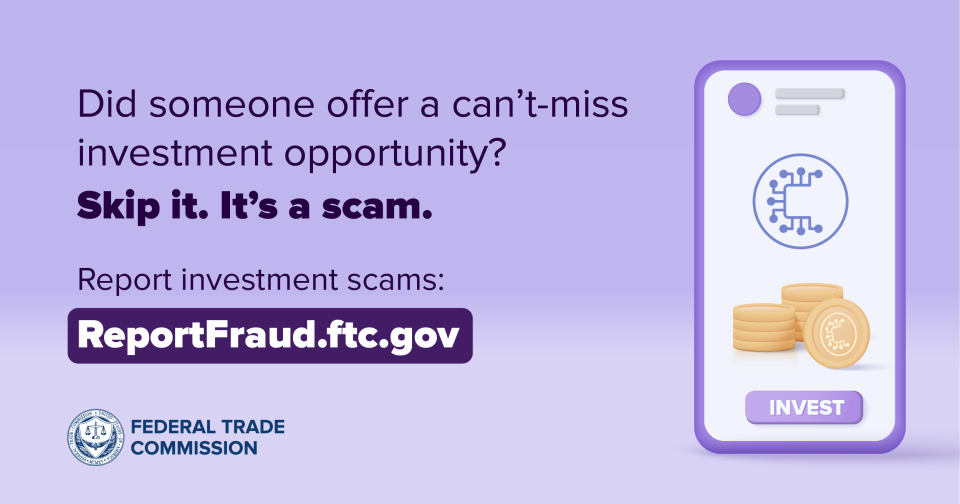Crypto investment talk is everywhere — even in your local community groups in real life or online. But scammers join these groups, too. Their mission? Gain the group’s trust…and then exploit relationships and trick you into crypto investment scams. But how do you spot and avoid these scammers?
Scammers use common bonds to build trust. They might speak the same language as you, claim to be the same age, or pretend to share things in common like your religion, ethnicity, hobbies, or profession. Why? Because when they then offer crypto investment advice or help, they think you’ll be more likely to listen. Once they start chatting with you, before long, they’ll ask you for money to invest in crypto, make up a reason you need to send a payment in crypto, or both. But if you give it to them, the money or crypto will be gone.
The bottom line? Crypto investing comes with lots of risks, including scams. To spot the scams:
- Don’t believe promises that you’ll make money, get a big payout, or earn guaranteed returns. Those are signs of a scam. No one can guarantee crypto investment riches.
- Ask online group moderators to remove people pushing crypto. Or, if you’re a group moderator, remove anyone offering advice or “help” with crypto investing to prevent scams.
- Research before you invest. Scammers are exploiting what people don’t know about crypto. It pays to search online for the company or currency name with the words “review,” “scam,” or “complaint.” Find out how it works and where your money is going. If you need help making investment decisions while avoiding fraud, visit Investor.gov.
And remember, anyone who tells you to pay by cryptocurrency, wire transfer, or gift card is a scammer. If you pay, there’s usually no way to get your money back.
Read more at ftc.gov/cryptocurrency. Need to report a cryptocurrency scam? Visit Reportfraud.ftc.gov.


These have been in my email constantly for about two weeks
Thank you for this information. I hope everyone reading this shares it with everyone they can to spread the word about scams and fraud.
Are bitcoin mining operations legal?
How many bitcoin mining operations are in Texas?
Do bitcoin mining operations pay taxes?
In reply to Are bitcoin mining… by Edward Shelby
yes it is legal
not much
In reply to Are bitcoin mining… by Edward Shelby
"BITCOIN TRADING COMMUNITY" Is Scam or Good
I recieved several email links to someone trying to steal my Bitcoin. I sent 69 bucks in crypto. I am definitely happy to here about these scams. However, is there anyway to retrieve my Bitcoin that’s on the block? It definitely seems as tho it’s mine.
It's unfortunate, but it's human nature to be a predator out of need or greed. Oftentimes, the victimized are the least able to absorb the loss. Thank you for trying to remind, educate and inform people that when something is too good to be true, it mostly likely is a false promise. One needs to remembers that no one does anything for anybody without expecting something in return. The saying "There's no free lunch" is also something that people must take seriously. It's true to them, and it's true to strangers. These are dangerous times.
There's a company called Rubicontrade.net, currency exchange. Its a scam. I have proof on my- Smule app. I was just recently targeted
In reply to There's a company called… by Theresa
Yes, It's a scam. They ripped few of my friends.
AVOID AT ALL COSTS